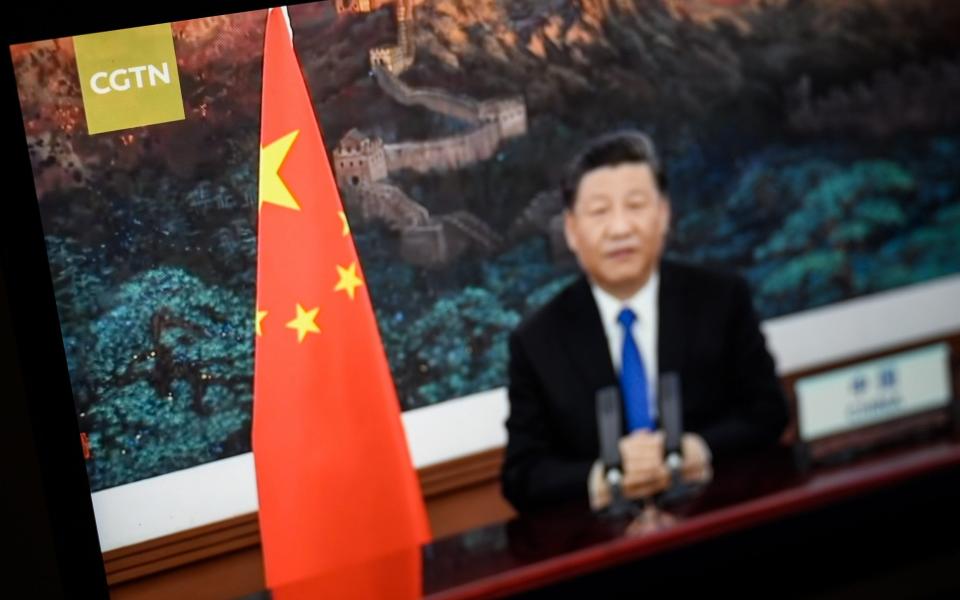China threatens retaliation after UK regulator cancels state TV licence

China has accused the UK of “political oppression, double standards and hypocrisy” after regulator Ofcom banned Chinese state broadcaster CGTN from British airwaves.
The foreign ministry in Beijing accused Ofcom of making a decision “based on ideological prejudice and political reasons,” and “urged the UK to immediately stop its political manoeuvres and recent mistakes".
China “reserves the right to take action in response,” said Wang Wenbin, foreign ministry spokesman, without specifying any measures.
On Thursday, Ofcom revoked CGTN’s licence to broadcast in the UK after finding it was “ultimately controlled by the Chinese Communist Party,” violating rules that require organisations to exercise editorial oversight and not be controlled by political bodies.
Beijing also appeared to ridicule Ofcom’s finding. “China is a socialist country led by the Communist Party, and the British side has always clearly known the attributes of the Chinese media from the first day CTN arrived and began broadcasting in the UK 18 years ago,” said Mr Wang.
The decision can be challenged in British courts, though CGTN has not said whether it plans to do so.
The move also provoked the Chinese foreign ministry to criticise the BBC for its “fake news” coverage of coronavirus in China, remarks that were among the top trends on China’s Weibo social media platform on Friday.
BBC broadcasts, like those of most major Western news outlets, are already blocked in China, but some people online called for the British broadcaster to be expelled from the country completely.
“The BBC has long been stationed in Beijing, yet has always held ideological prejudice and broadcast fake news from its platform, deliberately defaming China. After so many years, it’s past time that we took action,” one Weibo user said.
While CGTN will no longer be allowed to broadcast programmes within the UK, the organisation is able to continue operations, including from London, where it opened a major global broadcasting hub in 2019.
CGTN – which blasted Ofcom for being “manipulated by extreme right-wing organisations and anti-China forces” – is also still able to publish content on its own website, and on social media platforms.
Western politicians, including in the UK, have increasingly raised concerns over disinformation and espionage risks posed by the expansion of Chinese state media overseas.
Three Chinese people understood to be intelligence officers for China’s Ministry of State Security arrived in the UK under the false pretext of working for state media outlets in the past year, the Telegraph revealed.
China’s foreign ministry on Friday, however, denied knowledge of the matter. “On the one hand, they function on normal journalists gathering news; on the other hand, they write so-called internal reports for the Party and government,” said Willy Wo-lap Lam, an expert on Chinese politics and government, and adjunct professor at the Chinese University of Hong Kong.
China has invested billions of dollars in building its state media presence overseas, with state-controlled outlets including CGTN, Xinhua, and China Daily establishing numerous posts abroad.
Efforts picked up pace after leader Xi Jinping, who took power in 2012, began encouraging state media “to tell China’s stories well.”
Expanding abroad is “seen by Party leaders as necessary to address what they see as a fundamental unfairness in global public opinion,” said David Bandurski, a China media policy expert and co-director of China Media Project, a research program linked to Hong Kong University
“But we can’t forget that it is premised on repressive controls back at home and even active pursuit of critics abroad,” he said. “It is not storytelling hour, not China joining the rest of the world around the campfire to raise the diversity of voices; it is one voice – that of the Chinese Communist Party.”
Chinese state media, government officials, and embassies have also proliferated on Western social media seeking to present China’s narrative on a range of global issues from human rights abuses in Xinjiang to the origins of the coronavirus pandemic.
Some platforms, such as Twitter, have begun labelling accounts as “China state-affiliated media” or “China government account.”
In January, Twitter locked the account for China’s US embassy for a tweet that defended Beijing’s policy toward Muslim Uighurs in Xinjiang.
Such material published by Chinese state media is typically aimed at audiences outside of China, as platforms like Twitter and Facebook are banned within the country by government censors, which tightly control news and information.

 Yahoo News
Yahoo News 